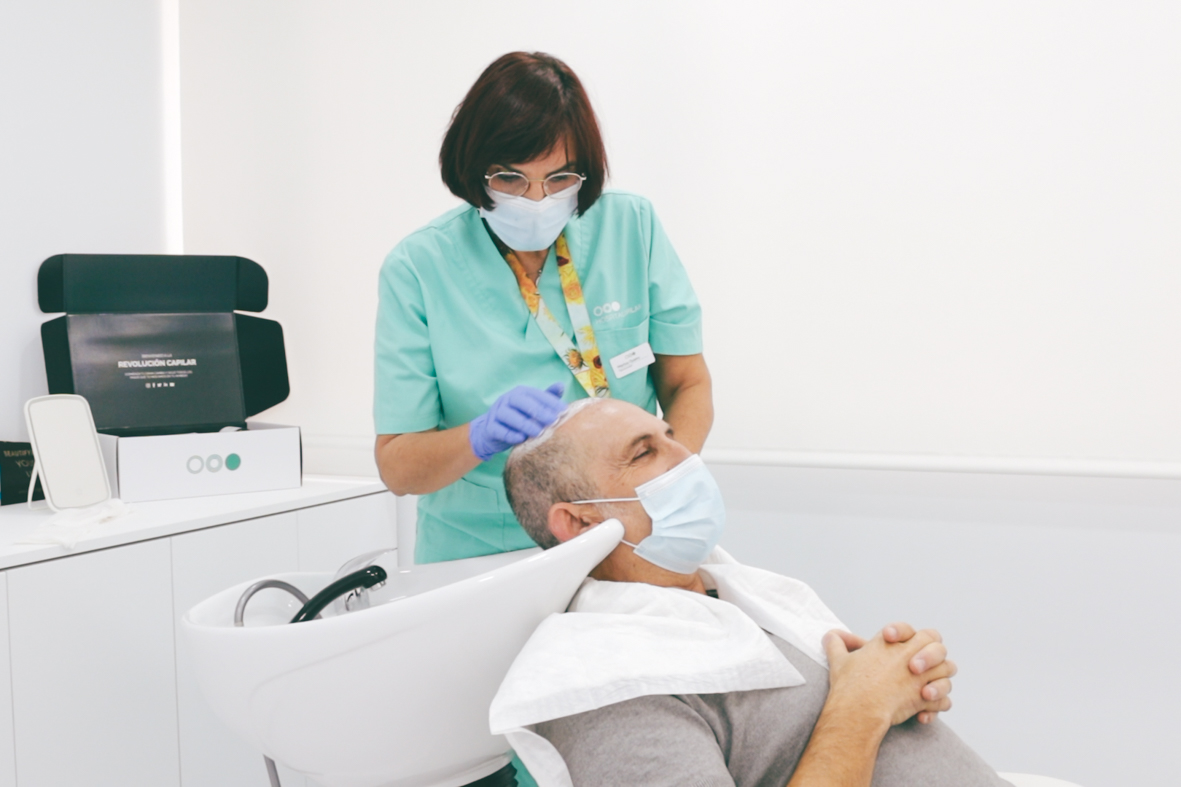
Alopecia is for many, and for more and more, a problem to which they want to find a solution. Although it is more common in men, there are also quite a few cases in women, and it can develop at any age, normally after 20. Suffering from alopecia at the age of 50 is very common, and yet there are those who wonder if it deserves the It's a shame to fix it at that age. Is a hair transplant effective if I have alopecia at the age of 50 or will my hair fall out again?
From Hospital Capilar, hair clinic specialist in hair grafting in Madrid, Pontevedra and Murcia, we tell you how it is advisable to act when you have alopecia at 50 years of age and if a hair transplant at that age is really effective.
La alopecia It is a disease that causes the destruction of the hair follicles in such a way that the hair falls out and does not grow back. This generates hairless or bald areas that, depending on the type of alopecia in question, a solution can be found by resorting to one treatment or another. In any case, it is important that a medical professional specializing in hair medicine determines which process to follow.
The most common type of alopecia, especially in men, is androgenic alopecia. This is hormonal and genetic and causes progressive hair loss. If the symptoms or effects that we suffer when we have alopecia at the age of 50 are, above all, hair loss on the crown, receding hairline, and frontal hair, it is most likely this type of alopecia.
Androgens, or male hormones, are responsible for hair miniaturization and subsequent destruction of the hair follicle. Does this have a solution in case of suffering this type of alopecia at the age of 50? The answer is yes according to our doctors. For this, it is important to go to a hair clinic where you will receive a personalized medical diagnosis to determine the best treatment to follow in each particular case.
Currently there are several drugs for oral consumption with which it is possible to stabilize alopecia. They require a prescription, so it must be a professional who recommends it. They are very effective as they stop hair loss and thicken miniaturized hair that has not yet fallen out.
Another option to stop alopecia with 50 years are the hair treatments. These replace the consumption of oral drugs and, although it must be the doctor who determines the guideline to follow, a session with a time interval of a few months between one session and another is normally necessary. It is a very comfortable option for those people who do not like the daily consumption of medicines.
En Hospital Capilar we have the HRT: Hair Redensification Treatment, and CRT: Capillary Regeneration Treatment. They are highly effective hair treatments, without the need for surgery, of dermoinfiltration in the scalp through microinjections.

Drugs and medical hair treatments are the perfect ally to stabilize alopecia at 50 years of age. But in no case will they make hair grow back in the areas where it was lost. The only method by which it is possible to recover the hair lost due to alopecia is the hair graft. But, is a hair implant worth it at 50 years old? Without a doubt, yes.
The success of a capillary implant does not depend on age, but on the thoroughness of the previous trichological study, as well as the skill of the surgeon and the postoperative period that the patient undergoes. If the medical team, regardless of age, confirms the viability of the hair transplant and expects successful results, it will be worth it.
A hair transplant consists of a series of stages that the patient goes through hand in hand with the medical team.
First of all, as we have mentioned before, is the capillary analysis. In it, the experts evaluate the general condition of the patient's scalp, the degree of alopecia according to the hamilton norwood scale in men or Ludwig scale in women, and determine whether or not the patient is suitable for the intervention. If surgery is feasible, start the capillary graft preoperative where it is necessary to take into account several issues so that the surgery is as successful as possible.
On the day of the intervention, the doctor designs the receiving area, taking into account the tastes and preferences of the patient, as well as their physiognomy. In the marked limits is where the follicles will be implanted and the new hair will grow.
The donor area is also designed, that is, the area from which the necessary follicular units will be extracted.
Hair grafting is an outpatient procedure that does not require general anesthesia, only local anesthesia is applied. This is usually the only part that can cause some discomfort and, for this reason, in Hospital Capilar We make available to our patients a pre-anesthesia service with which we managed to reduce the pain of the anesthesia application itself considerably.
The health team proceeds to extract the follicular units from the area that is not affected by alopecia. This is done with a special instrument, a punch with micromotor, which allows the follicles to be extracted one by one without damaging the area excessively. When they are extracted, they are placed in Petri dishes for better preservation.
Once the necessary follicular units have been extracted, the surgeon makes the cavities in the recipient area where the follicles will be implanted. This supposes an exercise of precision on the part of the doctor.
En Hospital Capilar We make the incisions with sapphire scalpel since it allows us greater precision and better results, since it reduces bleeding and promotes healing.
The last step of a capillary graft is the implantation phase of the follicular units. Once finished, start the postoperative where the patient must comply with all medical indications to avoid possible complications that may affect the aesthetic results.

En Hospital Capilar We have an expert and experienced team with which to obtain successful results. In addition, we have different price packs to respond to your particular needs. Interested? Request your free hair diagnosis and put yourself in the best hands!
Sanitary Reg. No. Pontevedra: C-36-003121 Sanitary Reg. No. Madrid: C517593 Sanitary Reg. No. Murcia: 30800014


Copyright © 2021 - Legal Notice and Privacy Policy - Cookies policy